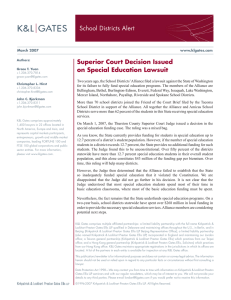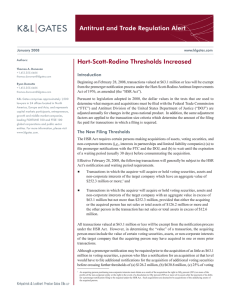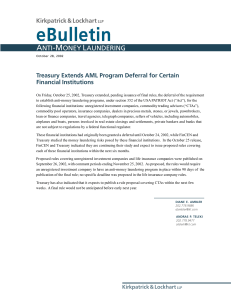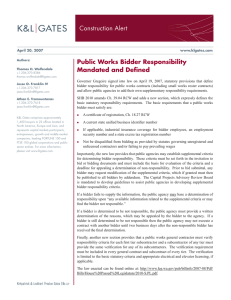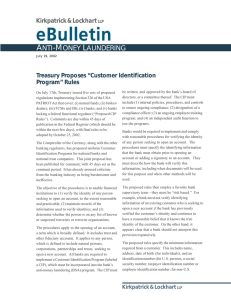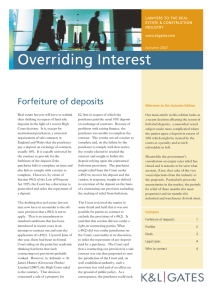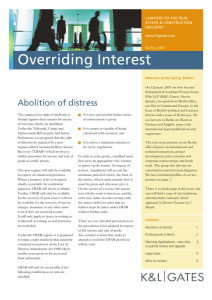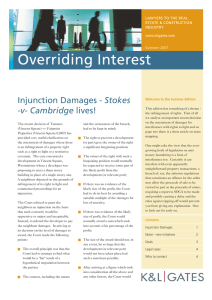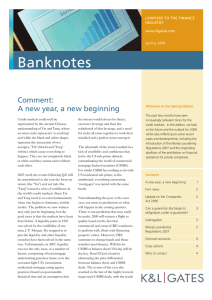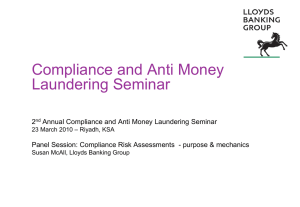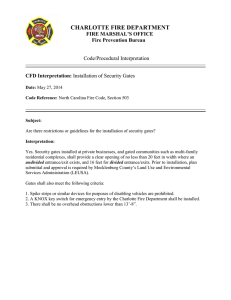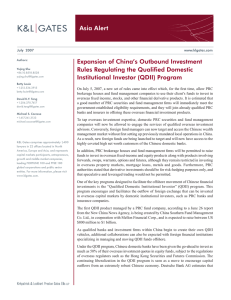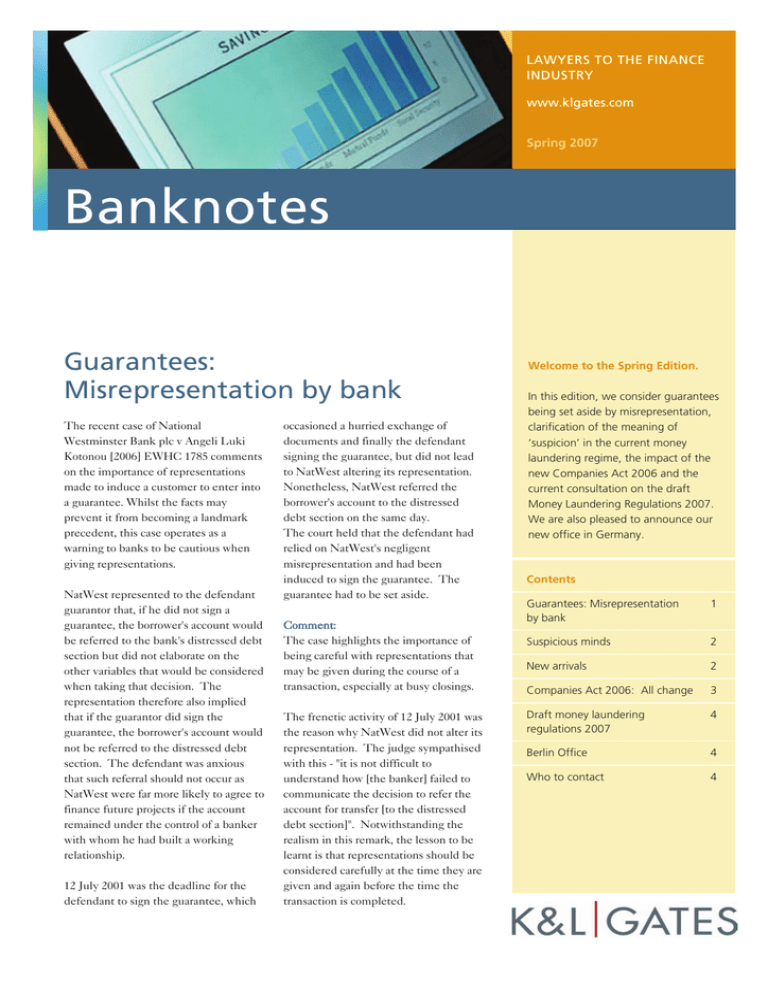
LAWYERS TO THE FINANCE
INDUSTRY
www.klgates.com
Spring 2007
Banknotes
Guarantees:
Misrepresentation by bank
The recent case of National
Westminster Bank plc v Angeli Luki
Kotonou [2006] EWHC 1785 comments
on the importance of representations
made to induce a customer to enter into
a guarantee. Whilst the facts may
prevent it from becoming a landmark
precedent, this case operates as a
warning to banks to be cautious when
giving representations.
NatWest represented to the defendant
guarantor that, if he did not sign a
guarantee, the borrower's account would
be referred to the bank's distressed debt
section but did not elaborate on the
other variables that would be considered
when taking that decision. The
representation therefore also implied
that if the guarantor did sign the
guarantee, the borrower's account would
not be referred to the distressed debt
section. The defendant was anxious
that such referral should not occur as
NatWest were far more likely to agree to
finance future projects if the account
remained under the control of a banker
with whom he had built a working
relationship.
12 July 2001 was the deadline for the
defendant to sign the guarantee, which
occasioned a hurried exchange of
documents and finally the defendant
signing the guarantee, but did not lead
to NatWest altering its representation.
Nonetheless, NatWest referred the
borrower's account to the distressed
debt section on the same day.
The court held that the defendant had
relied on NatWest's negligent
misrepresentation and had been
induced to sign the guarantee. The
guarantee had to be set aside.
Comment:
The case highlights the importance of
being careful with representations that
may be given during the course of a
transaction, especially at busy closings.
The frenetic activity of 12 July 2001 was
the reason why NatWest did not alter its
representation. The judge sympathised
with this - "it is not difficult to
understand how [the banker] failed to
communicate the decision to refer the
account for transfer [to the distressed
debt section]". Notwithstanding the
realism in this remark, the lesson to be
learnt is that representations should be
considered carefully at the time they are
given and again before the time the
transaction is completed.
Welcome to the Spring Edition.
In this edition, we consider guarantees
being set aside by misrepresentation,
clarification of the meaning of
‘suspicion’ in the current money
laundering regime, the impact of the
new Companies Act 2006 and the
current consultation on the draft
Money Laundering Regulations 2007.
We are also pleased to announce our
new office in Germany.
Contents
Guarantees: Misrepresentation
by bank
1
Suspicious minds
2
New arrivals
2
Companies Act 2006: All change
3
Draft money laundering
regulations 2007
4
Berlin Office
4
Who to contact
4
Banknotes
Suspicious minds
Given the nature of their work, banks
necessarily face situations where
customer activity might arouse
suspicions of money laundering.
Where such suspicion arises, a banker
risks committing a criminal offence
under the Proceeds of Crime Act 2002
unless a disclosure is made to the
Serious Organised Crime Agency
("SOCA") and, if necessary, consent
sought to continue with a transaction.
In such situations, the obligation to
disclose suspicious customer
transactions overrides the banker's
obligation to carry out customer
instructions.
But when does a "suspicion" arise? A
number of cases have considered this
question in recent years. The latest is
K Ltd v National Westminster Bank
plc [2006] EWCA Civ 1039. In this
case, the customer instructed the bank
to transfer money received from a third
party's offshore account in respect of a
consignment of mobile telephones.
For various reasons, these instructions
aroused suspicion by the bank officer of
money laundering and accordingly the
bank made disclosure and sought
consent to proceed with the transaction
under the Proceeds of Crime Act 2002.
In the meantime, the bank informed
the customer that it was unable to
comply or to discuss the matter further.
The customer unsuccessfully sought an
injunction against the bank, claiming
that the bank had acted improperly.
The following conclusions can be
drawn from the judgment:
2
if a bank officer has suspicions that
customer instructions may assist
any use of criminal property, it
would be a criminal offence under
SPRING 2007
the Proceeds of Crime Act 2002 for
the bank to carry out those
instructions without the consent of
SOCA. The bank's contractual
obligation to fulfil customer
instructions is therefore temporarily
suspended on the grounds of
illegality. During the period of
suspension, contractual obligation
can be neither a defence to the
offence committed if the bank
agrees to carry out instructions, nor
a cause of action for the customer if
it refuses; and
whether a bank officer is suspicious
is a subjective fact, depending on a
person's subjective response to a
known set of facts. The law does
not require the person to have
reasonable grounds for forming
suspicions. Once a bank employee
has confirmed that he had a
suspicion "any judge would be
highly likely to find that he did
indeed have that suspicion."
Comment:
This case is symptomatic of an
increasing tolerance in business, the
law and its enforcement of a degree of
commercial disruption in order to
facilitate procedures designed to tackle
money laundering and the criminal
activities it supports. The judgment
recognises the potential conflict
between banks' statutory obligations
under the money laundering regime
and their contractual obligations to
their customers. When a bank is
suspicious, the former overrides the
latter. The court accepted that "limited
interference is to be tolerated in
preference to allowing the undoubted
evil of money laundering to run rife in
the commercial community."
What is interesting is that a reporting
obligation under the Proceeds of Crime
Act 2002 and consequential prohibition
on carrying out customer instructions
arise on the occurrence of a mere
suspicion even if that suspicion is
objectively unreasonable. Following
the reporting of a suspicion, unless
consent to a transaction is obtained, all
payments into and out of the account
are barred and the bank, to avoid
tipping off, is unable to tell the
customer the reasons why. There
appears to be no remedy for an
innocent account holder who suffers
serious consequences having been the
subject of an objectively unreasonable
suspicion.
New arrivals
The banking group has recently
welcomed the arrival of Trevor Beadle
and Andrew Petersen from Dechert
LLP in London.
Trevor has considerable experience
working with investment and
commercial banks, investment
management firms and hedge fund
groups in relation to their structured
finance, real estate finance and
acquisition finance activities. Trevor's
breadth of practice in the real estate
finance industry develops and diversifies
our resource in this area. Trevor has
acted on real estate finance matters in
the UK and Europe for lenders,
arrangers and rating agents. Trevor has
been named as a finance expert by the
Legal 500 since 2000 and by Chambers
since 2003.
Andrew's experience covers loan
origination, secondary market work and
conduit lending as well as synthetic and
property derivatives. He has recently
edited and contributed to the first book
dedicated to European CMBS published
by Thomson Sweet Maxwell.
www.klgates.com
Companies Act 2006: All change
On 8 November 2006 the long awaited
Companies Act 2006 received royal
assent. It is being brought into force in
stages between January 2007 and
October 2008. The new law will
replace the Companies Act 1985 in full
and some of the most important
changes for banks are outlined below.
The prohibition on private
companies giving financial
assistance for the acquisition of
their own shares is to be abolished.
As a result, the combination of
resolutions and statutory
declarations known as the
"whitewash" procedure, currently
used to sanction financial
assistance, will no longer be
necessary. This will simplify intragroup funding and collateral
security arrangements and can only
be welcomed by lenders and
borrowers alike. That said,
directors will still need to have
regard to the Act's codified general
duties and their duties under the
general law. The financial
assistance regime will remain in
place for public companies
although, as a result of the Second
Company Law Directive (and
separately from the Companies Act
2006), that regime is also to be
relaxed to permit public companies
to provide financial assistance for
the acquisition of their own shares,
subject to a statutory procedure.
power for the Secretary of State
which will enable him to alter, add
to or repeal provisions of the
Companies Act 2006 relating to the
registration of security. The
Government has indicated that this
power may be used to streamline
the registration process and possibly
require the submission of copy (as
opposed to original) instruments.
The new law does not require
foreign companies, which have not
registered a branch or place of
business here, to register charges
over UK assets. Consequently, the
Slavenburg register, familiar to any
lender dealing with foreign
corporate borrowers, will lose its
significance and become purely an
historical record.
The company's memorandum will
become a formal document
recording the position at the point
of registration, leaving only the
articles as the live constitutional
document. Companies will no
longer be required to specify their
objects. For existing companies,
provisions that were in the
memorandum of association of the
company will be treated as
provisions of the articles so
limitations of powers in both
documents (for example as to
borrowing, guaranteeing or
securing) will need to be
considered.
Under the current law the following
take priority over floating charges
created on or after 15 December
2003: employee claims and unpaid
pension contributions, the ringfenced fund and administration
expenses. The Companies Act
2006 includes a new provision
amending the Insolvency Act 1986
to also give priority to liquidation
expenses. Such expenses could, in
certain circumstances, be significant
and so this change could
substantially reduce the value to a
lender of its floating charge.
The provisions for registration of
security remain substantially the
same (save as to the Slavenburg
register - see below) and do not
incorporate the Law Commission's
amendment proposals. However,
there is a new regulation-making
SPRING 2007
3
Banknotes
Draft Money Laundering
Regulations 2007
In January 2007, the Government
published a draft of the Money
Laundering Regulations 2007 for
consultation. These regulations will
repeal and replace the existing Money
Laundering Regulations 2003 and,
under the terms of the Third Money
Laundering Directive, need to be in
force by 15 December 2007 (although
they are expected to be finalised midyear to give organisations a chance to
prepare for their implementation).
Once implemented, the new
regulations 'should' ensure that UK
legislation is in line with European
legislation and international best
practice for preventing money
laundering and terrorist financing.
One of the main changes for banks and
others in the regulated sector proposed
by the new regulations relates to
customer due diligence. Banks will be
required in most cases to identify and
verify the identity of the ultimate
beneficial owner of the customer and to
understand its ownership and control.
Berlin Office
They will also be required to undertake
ongoing monitoring of the customer to
ensure that transactions are consistent
with their knowledge of the customer,
his business and risk profile. Enhanced
due diligence will be required where,
amongst other situations, the customer
is not physically present for
identification or is a politically exposed
person (an individual "entrusted with
prominent public functions", their
family members or known close
associates).
In January 2007 K&L Gates opened
the doors to its new Berlin office. This
expansion will benefit those clients
with business activities in Germany
and we look forward to many
opportunities for collaboration with our
new colleagues.
New provisions will prohibit credit
institutions and financial institutions
from entering into a correspondent
relationship with a shell bank or setting
up an anonymous account or passport
for any new or existing client.
The consultation period ends on 2
April 2007. Further details of the
consultation and a copy of the draft
regulations can be found at www.hmtreasury.gov.uk/Consultations_and_Le
gislation/consult_index.cfm
Who to Contact
K&L Gates
For further information contact
110 Cannon Street
Richard Hardwick
London EC4N 6AR
email: richard.hardwick@klgates.com
www.klgates.com
tel: +44 (0)20 7360 8125
T: +44 (0)20 7648 9000
F: +44 (0)20 7648 9001
K&L Gates comprises approximately 1,400 lawyers in 22 offices located in North America, Europe and Asia, and represents capital markets participants, entrepreneurs, growth and middle market
companies, leading FORTUNE 100 and FTSE 100 global corporations and public sector entities. For more information, please visit www.klgates.com.
K&L Gates comprises multiple affiliated partnerships: a limited liability partnership with the full name Kirkpatrick & Lockhart Preston Gates Ellis LLP qualified in Delaware and maintaining offices
throughout the U.S., in Berlin, and in Beijing (Kirkpatrick & Lockhart Preston Gates Ellis LLP Beijing Representative Office); a limited liability partnership (also named Kirkpatrick & Lockhart Preston
Gates Ellis LLP) incorporated in England and maintaining our London office; a Taiwan general partnership (Kirkpatrick & Lockhart Preston Gates Ellis) which practices from our Taipei office; and a
Hong Kong general partnership (Kirkpatrick & Lockhart Preston Gates Ellis, Solicitors) which practices from our Hong Kong office. K&L Gates maintains appropriate registrations in the
jurisdictions in which its offices are located. A list of the partners in each entity is available for inspection at any K&L Gates office.
This publication/newsletter is for informational purposes and does not contain or convey legal advice. The information herein should not be used or relied upon in regard to any particular facts or
circumstances without first consulting a lawyer.
Data Protection Act 1998 - We may contact you from time to time with information on Kirkpatrick & Lockhart Preston Gates Ellis LLP seminars and with our regular newsletters, which may be of
interest to you. We will not provide your details to any third parties. Please e-mail london@klgates.com if you would prefer not to receive this information.
4
SPRING 2007
©1996-2007 Kirkpatrick & Lockhart Preston Gates Ellis LLP. All Rights Reserved.

